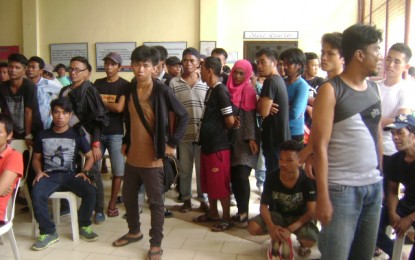
ZAMBOANGA CITY -- Some 398 Filipinos deported by Malaysian authorities for being undocumented aliens arrived in Zamboanga City onboard an inter-island boat on September 18.
The “halaw,” as these deportees are colloquially called, form the second batch after a two-year amnesty given by Malaysia to voluntarily repatriate themselves back to the Philippines expired last August 30.
Only 5,844 of the estimated over 400,000 “halaws”or less than one percent availed of the amnesty, the Department of Foreign Affairs earlier said.
An earlier estimate placed the number of undocumented Filipinos as approximately half a million, most of them Muslims from the provinces of Basilan, Sulu, Tawi-Tawi and Zamboanga Peninsula.
Many of them, especially their parents, fled to Sabah during the start of the Moro rebellion in the early 1970s.
Aside from its convenient geographical proximity, many Muslim inhabitants of the Sulu Archipelago believe that Sabah is part of their Sulu sultanate territorial possession.
Even the Philippine government, to date, has never renounced the country’s claim to sovereignty over resource-rich Sabah, also called North Borneo.
Department of Social Welfare and Development–9 regional information officer Ivan Eric Salvador said the first batch of halaws arrived in Zamboanga City last September 6.



Like the previous batch, they were ferried by M/V Antonia, which weekly plies commercially between Sandakan, Sabah and Zamboanga.
Deportation slowed down last year when the commercial sea craft that plied between Zamboanga and Sabah burned and sank.
Salvador said from January to August this year, DSWD has assisted 7,069 Sabah deportees, who are temporarily housed at the department’s Center for Displaced Persons located in Mampang Barangay, Zamboanga City.
He said the department has spent some PHP10.3 million so far in assistance to them.
As soon as the undocumented Filipinos are caught, the Malaysian authorities inform the Philippine embassy in Kuala Lumpur of their identities and the consulate issues individual exit passes to them.
A social work attaché in the embassy, Salvador said, coordinates with all the concerned Philippine government departments about the imminent deportation, since Malaysia and the Philippines have an agreement that the latter will not accept back the halaws unless they are properly documented and validated as Filipino nationals.
So when they exit Sabah, their exit passes stamped by the Malaysian authorities are stamped anew by Philippine immigration officers before they are allowed to disembark from the ferry that brought them to Zamboanga.
Afterwards, they are taken to the DSWD center in suburban Mampang.
There, they are individually profiled -- names, place of origin, names and number of children (usually travelling with them), and other basic information, Salvador said.
As they settle down, they are provided with hot meals three times a day, sleeping quarters where the males and females occupy separate dormitories, and those who cannot be accommodated are assigned to the meeting hall of the center. The few, who are trafficked victims -- usually females who went to Sabah for work as illegals -- are sent to the Home for Women, in a different locations in the city, where they undergo debriefing.
Local health personnel also conduct a medical checkup for deportees who are sick -- usually from skin, colds, and upper respiratory ailments.
Salvador said those who require hospitalization are brought to the local government hospital.
In a day or two from their arrival, the deportees are sent back to their hometowns. They are given boat or bus tickets for their ride back home. They are also given stipends and food packs.
An inter-agency task force, Salvador said, tries to assist them all the way so that when they arrive back home, they can avail of livelihood assistance.
The task force is composed of the Departments of Labor, Health, Foreign Affairs, the Overseas Workers Welfare Administration, security forces, and local government units.
One deportee, who identified himself as Toy Kamlan, is a native of Siasi, one of the towns of Sulu province.
He emigrated to Sempornah, one of the islands of Sabah, 10 years ago. In Sabah, he worked as a fisherman and seaweed farm worker.
He said it was difficult to find a good-paying job back home, so he sailed to Sabah.
Malaysia acquired sovereignty over Sabah when it became a republic in 1963.
In a United Nations-sponsored plebiscite in North Borneo, the Sabahans elected to be citizens of Malaysia.
The plebiscite was prompted by the Philippines’ claim to North Borneo, which originated from the territories being gifted -- properly documented -- by a Brunei sultan to the Sulu sultan when the latter quelled a rebellion against the former sometime in the 1800s.
However, the Sulu sultanate later on leased the territory to a British commercial company, which retained the leasehold until Malaysia became a republic.
To date, Malaysia pays an annual rent to the Sulu sultanate on the basis of that lease.
A few years ago, the heirs and followers of the Sulu sultanate staged a violent raid in a futile attempt to retake Sabah, and were subsequently arrested, sentenced and now are in jail there.
Perhaps, sometime in the future, they, too, will comprise the next batch of halaws. (Rey-Luis Banagudos/PNA)
